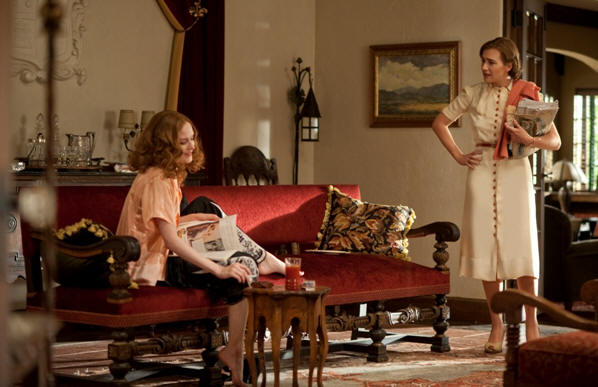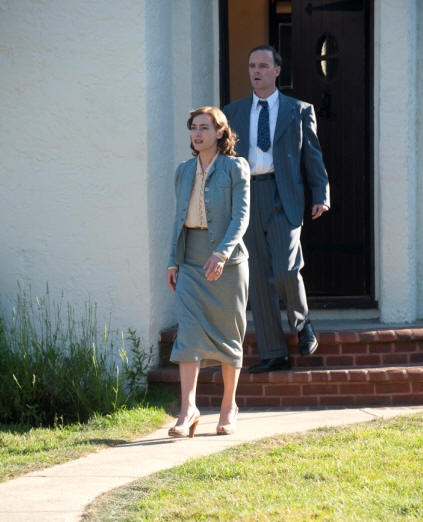
Friday, March 25, 2011
PHOTOS |
COMING SOON|
EXAMINER.COM FILM ARTICLES
||HOME
MOVIE REVIEW
(HBO)
Mildred Pierce
A Woman's Search For A
Connection With Her Daughter

Evan Rachel Wood (left) as Veda and Kate Winslet in the title role in "Mildred Pierce", directed by Todd Haynes.
The first two parts of the five-and a half-hour film show this Sunday night on
HBO. Andrew
Schwartz/HBO
by
Omar P.L. Moore/PopcornReel.com
 FOLLOW
FOLLOW
Friday,
March 25, 2011
My sincere apologies to the good people at HBO, for they had in fact sent
images for this review, but of course my packed e-mail box had a bout of
indigestion. Thanks again, kind people at HBO, for sending and resending
these. You know who you are.
Fasten your seat belts and buckle up for the majestic and beautiful "Mildred
Pierce", Todd Haynes' long-form film for television based on James M. Cain's
classic 1941 novel.
The new "Mildred Pierce" (the first two parts premiere on Sunday night beginning
at 9pm Eastern on HBO) departs markedly from Michael Curtiz's 1945 big-screen
drama starring Joan Crawford in her Oscar-winning title role. Mr. Haynes'
film strips out the noir characteristics of its forerunner, employing nuance,
deliberation and a touch of the cerebral, staying loyal to the mother-daughter
relationship at the core of Mr. Cain's novel.
Shot in 60mm and set in Glendale, California during the Depression of 1931,
barely eleven years after the Suffrage movement won women the right to vote,
"Mildred Pierce" stars Kate Winslet at the height of her acting powers as the
title character. In part one of this five-hour, 38 minute-film, Mildred
gets a job as a waitress so as to later establish herself in the food business.
By then Mildred will have ejected her philandering husband Bert (Brían F.
O'Byrne) from her home. In the severely poor economic climate of Hoover's
1930s Bert's Pierce Homes business goes under in part due to the machinations of
his business partner Wally (James LeGros).
Mildred's two daughters are sprightly, energetic beings. The elder
daughter, Veda, is a precocious, bratty primadonna who doesn't let her mother's
transgressions or flaws escape notice or editorializing. Trapped, Mildred
seeks the approval and love of her elder daughter, doing so in ways that see her
act out with men. Mildred has passions and is complex, but the love she
makes is only a temporary blindness from the confusion of roles with her
daughter -- roles that feel as if they are swapped like a Freaky Friday in
Glendale. Mildred is often the child and Veda the parent. Throughout
the five-hour-plus film, a masterwork, it feels as if Mildred is fighting
herself.
Parts two, three, four and five bring various ups and downs for Mildred Pierce
as she confronts reliable and unreliable people in her life. Mildred's
life is an abiding roller-coaster search for love -- not of the men who lust
after and comment on her body but of the one person she has competed with
forever.
With pride, desperation and commitment defining her, Mildred Pierce is given
full-blooded life by Ms. Winslet, who combines intelligence, a solid set of
principles for Mildred and a refreshing power and openness barely sublimating
the homoerotic strain underlying Mildred's need for her daughter's attention,
respect and affection. Ms. Winslet has always delved deep into the mind
and the physicality of her characters ("Hideous Kinky",
"Little
Children",
"The Reader") and does so again here,
particularly in the middle and latter installments of Mr. Haynes' film.
To that end "Mildred Pierce" pulses with strong, steamy eroticism that will
arouse the most deadened of souls. The sex scenes aren't showy,
gratuitous, prurient or stylized but are presented naturally, in an unbridled,
adult way consonant with Mildred's emotional and physiological needs. The
scenes are thoughtful, sensual, passionate and real. In a remarkably
well-acted scene of an amorous dance we see Ms. Winslet thinking her character
through -- it's beautifully, amazingly written all over her face -- as a lover
tries to separate her from her light-green party dress in part three.
In many ways Kate Winslet is absolutely perfect for Mr. Haynes' film: an
outsider in her own sense -- she's not a typical "Hollywood" actress nor is she
thought of as the anatomical waif or fashion-model standard Tinseltown often
desires. Ms. Winslet, bless her heart, is her own natural woman and
proudly celebrates that fact, with a voluptuous body type she doesn't hide from
the camera. I scoff to myself that, aside from the obvious reasons
(including contractual) why many American actresses don't bare their naked
bodies, Hollywood actresses with the more "perfect" bodies in films in scenes
during and after sex, are often covering up their supposed perfections in bed.
In reality these actresses wouldn't be covered up but for, of course, the
millions of future viewers and more immediately the dozens and dozens of male
crew members surrounding the actresses during the filming of such sex scenes.
Ms. Winslet doesn't hesitate to disrobe, not as titillation or cheap, immature
seduction, but in the guise of an authentic stamp of a character who expresses
and searches for complete expression. This is true of all of her
similar-themed work on the big screen.

"Mildred Pierce" director Todd
Haynes, during a Q&A for the HBO film last night in San Francisco. Omar
P.L. Moore
At the same time however, Ms. Winslet is also classical -- a throwback to some
of the demure but wise actresses of the 1940s: explosive yet quietly sensual --
though Ms. Winslet is more overtly so as she portrays her characters' feelings
and physical explorations.
If it makes sense, Mildred may be something of a "reverse child": a parent
seeking and chasing the approval of her daughter. She can't separate from
Veda as she matures -- and matures not always to Mildred's likings, expectations
or desired specifications.
A perpetual outsider to her daughter, to men and to much of a troubled society
at large, the solitary Mildred makes her way through a tough life, accessing the
pleasures and pitfalls of her very existence. Mildred has love, she has
regrets, but she doesn't have the all-important validation that makes her
complete and self-satisfied.
"Mildred Pierce", which transpires over a nine-year period through to 1940 over
its five part-odyssey, is directed with keen observance by Mr. Haynes, who
brings his independent sensibilities and signature styles to this epic produced
by long-time collaborator Christine Vachon. Mr. Haynes references several
of his films in "Mildred Pierce", including his 1990s television film "Dottie
Gets Spanked", which played with spanking as a sadomasochistic delight.
The moment appears during an unmistakable scene in part two of "Pierce".
There is dialogue in part two that screams wink-wink spank-spank from the
director. Despite the intensity, "Mildred Pierce" is often a very funny
drama and the language and texture of the film is often sunny.
The material written for television by Mr. Haynes and Jon Raymond is incisive
and meticulous. Mr. Haynes has always fashioned films that celebrate or
chronicle the plight, power and passion of the outsider, the sexually alive or
identifiably stereotyped, or socially maligned "other". Whether in
"Poison" or "Safe" (the latter of which this latest creation has a kinship
because of the suburban malaise and suffocation Mildred seems unable to shake),
or in films like "Far From Heaven", whose Sirkian flourishes aren't evident here
but whose outsider status most definitely remains. There's also an
identity shifting that borrows from Mr. Haynes' 2007 film
"I'm Not There"
as the childlike Mildred (naïve and always a step behind the rest of the
characters) collides with the Mildred whose adult passions are unrestrained and
decisive.
Aside from Ms. Winslet's fine work (her best along with her work in "Little
Children",
"Revolutionary Road" and "The Reader",) there are a slew of excellent
supporting performances especially from Mr. O'Byrne, a great Tony-winning New
York stage actor (also in such films as
"Brooklyn's
Finest" and
"Before The Devil Knows You're Dead"), Mare
Winningham as Ida, a waitress who becomes a good friend to Mildred, Mr. LeGros
as the ne'er-do-well Wally, and Guy Pearce as the lazy, shiftless leach Monty
Beregon.
Also brilliant is Evan Rachel Wood, a scene-stealer in parts four and five as
the older Veda. Ms. Wood is strong, powerful and absolutely terrific as a
single-minded and emboldened enfant terrible, in some of the best acting she's
ever done. Ms. Wood challenged Holly Hunter in "Thirteen" and Mickey
Rourke in "The
Wrestler" as the lovelorn, estranged daughter to both actors, and she
gives as good as she gets here as a rival to Ms. Winslet's Mildred.

Kate Winslet
as Mildred Pierce and Brian F. O'Byrne as Bert Pierce in "Mildred Pierce".
Andrew Schwartz/HBO
The scenes between Ms. Winslet and Ms. Wood (and Ms. Winslet and the terrific
Morgan Turner as younger Veda) crackle with tension and heat. You can't
suppress the deep anger you feel when Veda back-talks, insults and slaps her
mother. You want Mildred to do something more about it as a parent, but
you are left with your anger. This is precisely the spirit and state of
flux in which Mr. Cain and Mr. Haynes want you to wallow and foment. It's
devilishly effective. You want and desire the release of the high tension
as much as these charged characters do.
Mildred is an incomplete parent because she doesn't have the approval of Veda to
have the authority over her. There's an energy and unresolved sexual
tension in these exchanges, in the audacity of a daughter to combat her mother
and meet her slap for slap. The release comes in the complex entanglements
Mildred shares with the men in her life, and that fire and anger is displaced in
the erotic scenes Mr. Haynes shoots so artfully and tastefully.
The production of "Mildred Pierce" is superb, with Mr. Haynes' frequent
cinematographer Ed Lachman lensing a colorful but restrained view of the title
character and her suburban entanglements. Using the influences and
techniques of renowned photographer and artist Saul Leiter and the style of
Fassbender (whom Mr. Haynes greatly admires), much of "Mildred Pierce" is shot
through glass with reframed and truncated views of the title character,
sometimes obscured by smoked glass, dirt, rain and other objects. There's
a camera obscura effect as well (younger Veda references the term at one point),
the refracting of image confining and framing Mildred in a closed, closeted
manner. "Mildred Pierce" is carefully calibrated at every moment, and
marvelously.
The glassy effect of the windows and the multiple mirrors further alienates
Mildred from her daughter, and perhaps even from herself. We always feel
that Mildred is being watched, whether by Veda or by another observer. The
voyeurism at play shows that Mildred doesn't get a moment's peace and is a
metaphor for the uneasiness she feels as she seeks the unattainable affections
of Veda, whom in truth loves Mildred but only from a distance. Mildred
isn't a put-upon, despairing or vulnerable woman but her pursuit of this
completeness sometimes leaves her naked.
Mr. Haynes captures the financial struggles of the 1930s and the unmistakable
economic crises of the present-day pulls us in, giving us another identifiable
character to project onto, making the film very relevant and timely.
Carter Burwell's music is a fine accompaniment and Ann Roth's natty costumes
capture the era wonderfully. The class distinctions of "Mildred Pierce"
are obvious, and the fissures within the middle class are deeply felt in the
Pierce household, with Veda reminding Mildred of her monetary limitations and
status. Mildred hides her own shames and regrets but these surface at
inopportune times, always observed by her eagle-eyed tormentor.
On the big screen "Mildred Pierce" is a beautiful, strikingly rich film, and on
television it plays like a film too. Sure, some of the effect of the
larger screen presence is lost, but the impact of the story, particularly the
central tug between Mildred and Veda remains. "Mildred Pierce" is one of
the best films of the year, but it deserves a nationwide theatrical
presentation. Most Americans don't have HBO and I'd bet that even in these
financially challenging times more than a few would be willing to part with some
ducats to watch Mr. Haynes epic. "Mildred Pierce" is worthy of many
awards, and whether Emmys or otherwise, any such accolades are well-deserved.
With: Melissa Leo, Richard Easton, Halley Feiffer, Marin Ireland, Murphy Guyer.
"Mildred Pierce" would presumably be given a TV-MA rating.
It is for adults and contains language, violence, and strong sexual content.
The film's running time is five hours and 38 minutes. Episodes one and two
premiere on HBO on Sunday, beginning at 9pm Eastern U.S. and are repeated during
early April on HBO and HBO2. Episode three debuts on HBO on April 3 and is
repeated throughout April on HBO and HBO2. Episodes four and five debut on
HBO on April 10 and are repeated throughout April on HBO and HBO2. Each
new episode premieres at approximately 9pm Eastern on Sundays.
COPYRIGHT 2011. POPCORNREEL.COM. ALL RIGHTS RESERVED.  FOLLOW
FOLLOW
SUBSCRIBE TO THE POPCORN REEL MOVIE
REVIEWS RSS FEED
